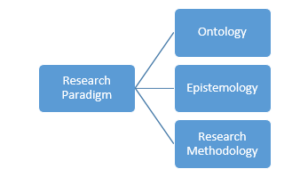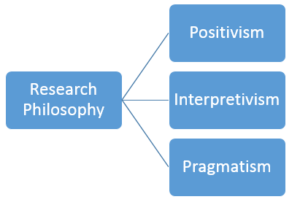A research paradigm is an approach or a model or a pattern to conduct research. It is a framework of thoughts or beliefs or understandings within which theories and practices operate. It acts as a function of how a researcher thinks about the development of knowledge. In simple words, a research paradigm is a process of creating a blueprint of research.

A research paradigm is of three types-
- Ontology– Ontology is a belief about reality. Ontology believes that either a single reality exists or it does not exist. To be more specific, ontology answers one question- “What is a reality”. For example, consider the question “Does God exist”. Now, there can be two realities (or ontologies) to this question. First is “Yes, God exists” and second is “No, God does not exist”
- Epistemology– Epistemology is the study of knowledge. Epistemology is concerned with all aspects of the validity, scope and methods of acquiring knowledge, such as a) what constitutes a knowledge claim; b) how can knowledge be acquired or produced, and c) how the extent of its transferability can be assessed. Epistemology answers one question – “How can we know reality”. For example, consider the question “How do you know whether God exists or not”.
- Research Methodology– It refers to general principles that underline how one investigates the social world and how one demonstrates that the knowledge generated is valid. The question addressed in methodology is “How to go about in finding the reality/ answer”. In general, research methodology is used to create a process of how to collect and analyze the data for research
Also read Advantages of Hiring a Thesis Writing Service
Research Philosophy together with research methodology create a research paradigm

Research philosophy is defined as the development of research assumption, its knowledge, and nature. Research philosophy presents the nature of the research, the type of data associated with its, the understanding of the sources of the data and theoretical approaches to analyze it.
“Ontology and epistemology are two ways of viewing a research philosophy”.
There are four major types of research philosophies-

- Positivism (Objectivism) – Positivists believe that there is a single reality which can be measured and known. Therefore, quantitative methods are used to measure this reality. Positivism in research is a philosophy that is closely associated with the idea of fact-based investigation. A research-based on positivism philosophy follows a rigorous method of systematic investigation of data sources. It believes that only “factual” knowledge gained through observation including measurement is reliable. In positivism, the role of the researcher is limited to data collection and interpretation. It depends on quantifiable observations that lead to statistical analyses. In positivism-based researches, a hypothesis is proposed which is proved using statistical analysis of data. The data here is collected through questionnaires (primary analysis) or is collected through existing data sources (secondary analysis). Here the relationship between two variables is established and the reason for relationship or answer to “WHY” is not found since positivism believes in the existence of a single reality. For example- Is there any significant relationship between employee performance and employee compensation.
- Interpretivism (Subjectivism/ Constructivism) -The term interpretivism refers to the ways via which one can gain knowledge of the world, which loosely relies on interpreting or understanding the meanings that humans attach to their actions. It does not believe in a single relative but is based on the existence of multiple realities. Thus, it uses qualitative methods to reach those multiple realities. Interpretivism integrates human interest into a study and assumes that access to reality (or realities) is only through social constructions such as language, consciousness, shared meanings, and instruments. Thus, here data is collected through interviews and talking to people s that different perspectives (different realities) of people can be analyzed. So, it is important for the researcher as a social actor to appreciate differences between people thereby using qualitative analysis. Here the emphasis is laid on finding an answer to “WHY” and unlike positivism, it is not merely focused on establishing a relationship between existing variables. For example- why are the employees in an organization not able to adapt to the new training system. Further, interpretivism can be biased since it is based on individual believes and experiences.
- Pragmatism– Pragmatism philosophy is dependent on the research question. It believes that the philosophy to be used in research is selected based on the research question. Pragmatics can combine both, positivism and interpretivism positions within the scope of single research according to the nature of the research question. It is a problem-oriented philosophy that takes the view that the best research methods are those that help to most effectively answer the research question. This then involves a mix of quantitative and qualitative methods used to evaluate different aspects of a research problem.
Also read How to Write Perfect Conclusion of Your Thesis
Further, to decide on the research paradigm, research methodology is to be decided as well. The research methodology includes specific procedures or techniques to analyze the data collected for the research. A research methodology includes-
- The approach used in research that is inductive, deductive or abductive
- The method employed is quantitative qualitative or mixed. It included both data collection method and analysis method
- Validity and reliability of research
For any queries, comments or additional information required on the above discussion, please drop a mail to info@helpinproject.com

